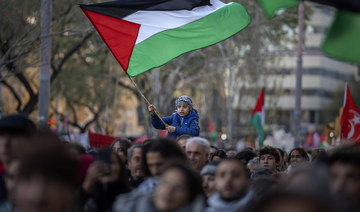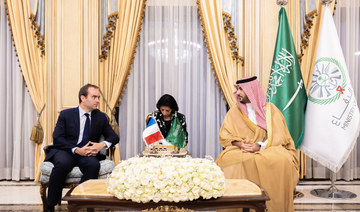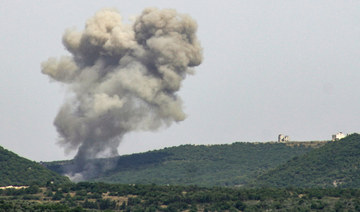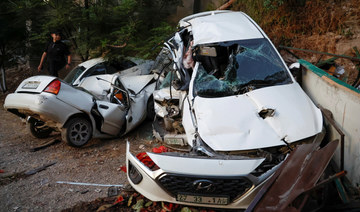BEIRUT: Alaa Arnous and his family found the photo of his father Mohammed online last week, the first proof of his fate since he was seized by Syrian government forces seven years ago. The image showed his corpse, his face battered and bruised, his mouth hanging open.
The elder Arnous was among thousands of Syrians who, since their country’s civil war began in 2011, went missing into Syrian government prisons. Survivors and rights groups say thousands more are known to have died under torture.
Anguished relatives are poring over photos of torture victims from Syrian prisons, posted online by activists after the United States imposed heavy new sanctions on the government of Syrian President Bashar Assad last month.
“We were living on hope that he was still alive,” Alaa Arnous told The Associated Press from the opposition-held town of Al-Tah in northwest Syria as he looked at his father’s photo on his smart phone.
“It is terrible when you see the photograph of your father and imagine what the torturers did to him,” he said.
The photo is among tens of thousands of images of torture victims smuggled out of Syria in 2013 by a forensic photographer-turned-whistleblower who used the code name Caesar. The photos became public at the time, but most were images of piles of bodies, difficult to identify.
But activists have begun circulating more detailed photos again online after the US imposed its new sanctions, named the Caesar Syria Civilian Protection Act, after the photographer. The sanctions bar anyone around the world from doing business with Assad’s government or officials, and among its provisions it demands Syria release detainees and allow inspections of its prisons.
For Mohammed Arnous’ wife, Nadima Hamdan, the impact of the photos was unbearable. She searched for hours through the photos. She not only found her dead husband — who was arrested in 2013 as he traveled to Lebanon for work — she also found photos of her brother and nephew.
“May God burn the hearts of those who burned our heart and turned our children to orphans,” she said.
Former detainees in Syrian government prisons speak of horrific experiences — being packed for months or even years in tiny cells, receiving little food and undergoing constant, severe torture.
“There were lots of people who died under torture. I used to be blindfolded but could hear a person tortured next to me taking his last breaths before he dies,” said Omar Alshogre, a former Syrian detainee speaking from Sweden, where he now lives.
Alshogre was detained at the age of 17 along with three of his cousins, two of whom died. He paid his way out of jail after three years in prison. Between 30 to 50 prisoners died every day at the facility where he was held, known as Branch 15, he said.
Alshogre, who testified about his ordeal at the Senate Foreign Relations Committee’s hearings on the sanctions in March, said Lebanese and other foreigners — including Iraqis, Palestinians and Tunisians — were also held at Branch 15.
The sanctions have also raised hope in neighboring Lebanon that Damascus will be pressured to reveal the fate of hundreds of Lebanese believed abducted by Syria during the years it dominated Lebanon — from the Lebanese 1975-90 civil war up to 2005. Alshogre’s testimony about Lebanese prisoners still alive further fueled their families’ demands for information.
In Beirut, Laure Ghosn has tried for 37 years to learn the fate of her husband who was kidnapped by a Syrian-backed group during the civil war and then handed over to Syrian authorities.
When Syria released a group of Lebanese prisoners in 2000, the name of her husband, Charbel Zogheib, was on a list of those expected to freed in a subsequent round, she said. But it never happened. More than 10 years ago, a Lebanese man released from Syria called her and told her he had been Zogheib’s cellmate in Syria’s notorious Tadmor prison, the 64-year-old Ghosn said.
“We want to know if they are alive,” Ghosn said, weeping, at her Beirut home. “If they need treatment, we can treat them. If they are dead and they have killed them, then we can pray for them.” Her daughter, Ruba, who was six when her father disappeared, sat next to her.
Ali Aboudehn, who spent years imprisoned in Syria and now heads the Association of Lebanese Prisoners in Syrian Jails, said his group and other activists have documented 622 Lebanese prisoners held in Syria. He said Lebanese authorities requested information about them from the Syrians, who acknowledged a few of them being held on criminal charges and denied any knowledge about others.
“I have hope,” said Aboudehn. “We cannot prove that someone is dead until we see that person’s body.” He said one of his cellmates, a Syrian-Lebanese, was alive up until 2018, when Aboudehn got word he died, 30 years after his arrest.
“They should either give us bodies or people who are alive. This is what will satisfy us,” he said.
According to the Syrian Network for Human Rights, Syrian authorities detained some 1.2 million people since the country’s conflict began in March 2011. As of the beginning of June, 12,325 were documented as having died under torture in Syrian government prisons, the SNHR said in a report released late last month.
At least 12,989 are still detained or missing, their fates unknown, according to the report. Another 16,000 are missing in detention by other factions in Syria’s war.
Alshogre says the number of those who died in Syrian government jails is much higher than 15,000.
In mid-June, two Lebanese politicians filed a legal complaint in Beirut against Assad over their missing compatriots. The move is largely symbolic.
“This is a wound that remains open for the families, and therefore such a wound does not heal,” said legislator Eddy Abilama of the Christian Lebanese Forces party.
“It is our responsibility to investigate this case as much as we can.”
Families of Syria detainees hope for news amid US sanctions
https://arab.news/w6xp4
Families of Syria detainees hope for news amid US sanctions

- Anguished relatives are poring over photos of torture victims from Syrian prisons, posted online by activists after the US imposed heavy new sanctions on the Syrian government
- Former detainees in Syrian government prisons speak of horrific experiences — being packed for months or even years in tiny cells, receiving little food and undergoing constant, severe torture
Arab League welcomes announcement by Spain, Ireland, Norway to recognize Palestine
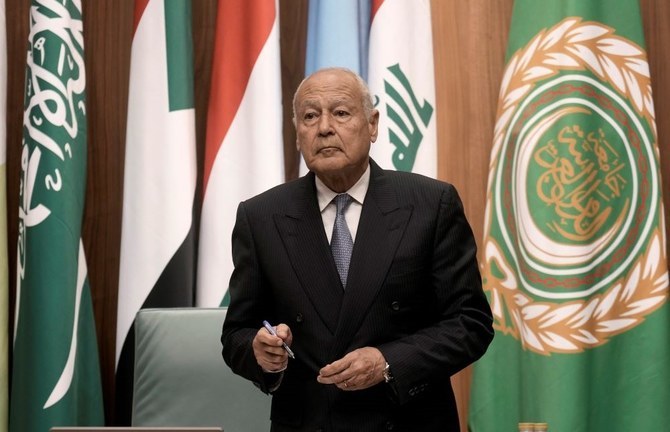
- Ahmed Aboul Gheit, Arab League secretary-general, said that this “significant move underscores a genuine commitment to the two-state solution”
- He urged countries yet to recognize Palestine to reassess their positions and align themselves with the course of history
CAIRO: The Arab League has welcomed the official recognition of the state of Palestine by Spain, Ireland, and Norway.
The prime ministers of the three countries said on Wednesday they were formally going to recognize Palestine as a state as of May 28.
Ahmed Aboul Gheit, Arab League secretary-general, said that this “significant move underscores a genuine commitment to the two-state solution and reflects the sincere desire of these nations to safeguard it from those seeking to undermine or eradicate it.”
Gamal Roshdy, Aboul Gheit’s spokesman, said that “this important development follows the recent recognitions by Barbados, Jamaica, Trinidad and Tobago, and the Bahamas. These additions bring the total number of countries recognizing the Palestinian state to approximately 147, aligning with the overwhelming global consensus.”
Roshdy said such recognition “is a fundamental aspect of the state's standing in international law.
This step “embodies a principled political, moral, and legal stance. It marks a significant milestone toward realizing the Palestinian state based on the 1967 borders, with East Jerusalem as its capital,” he quoted Abdul Gheit as saying.
Aboul Gheit said that “recognition conveys a clear message to Palestinians: the world stands resolute in defending their right to self-determination and the establishment of an independent state.”
He stressed that “amid the current hardships, a political pathway leading to the realization of the Palestinian state is inevitable.”
Aboul Gheit urged countries yet to recognize Palestine to reassess their positions and align themselves with the course of history.
He highlighted that recognizing Palestine signifies a genuine commitment to the two-state solution, diverging from violent approaches, and fostering peace and security across the region.
Washington stepping up defense cooperation with GCC states: US official
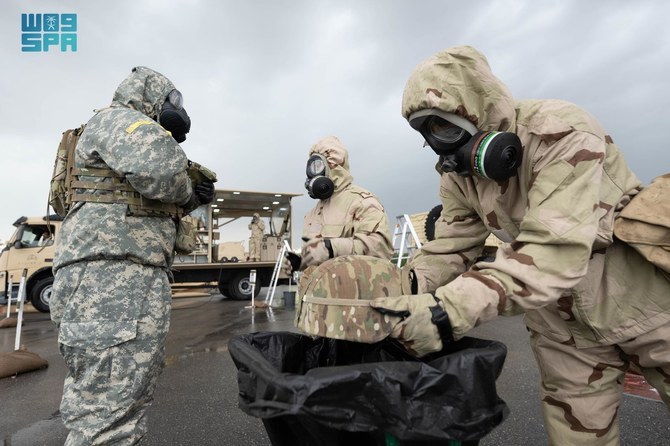
- ‘The threats from Iran and its proxies are pervasive,’ Dan Dhapiro tells briefing attended by Arab News
- ‘The US has an interest in deepening the partnerships we’ve forged with our Gulf partners’
LONDON: The US is stepping up defense cooperation with Gulf Cooperation Council countries in a bid to address one of the region’s “most challenging periods in recent years,” Dan Shapiro, deputy assistant secretary of defense for Middle East policy, told a press briefing attended by Arab News on Wednesday.
Gulf military representatives on Wednesday met senior US officials at the GCC headquarters in Riyadh as part of the partnership’s maritime and missile defense working groups.
It comes a month after Iran launched a massive drone and ballistic missile strike at Israel, and amid simmering regional tensions over the Gaza war.
Conversations between GCC and US officials are “more important than ever,” said Shapiro. “The US-GCC defense working groups are rooted in a strong US partnership with the GCC and our collective commitment to cooperating on regional security issues,” he added.
“For over a decade, we’ve worked together to address pressing threats and crises. The US has an interest in deepening the partnerships we’ve forged with our Gulf partners.”
Shapiro, who previously served as US ambassador to Israel and Abraham Accords envoy, warned that “the threats from Iran and its proxies are pervasive” in the region.
He said Yemen’s Houthi militia is carrying out “utterly illegitimate acts of terrorism” in its Red Sea campaign against civilian shipping.
The working group meetings saw US and Gulf officials explore ways to “bolster information sharing, counter proliferation, and increase the effectiveness of combined interdictions of illegal maritime shipments to the Houthis,” he added.
The April 13 Iranian attack on Israel, which Shapiro said was a “watershed moment in the Middle East,” also loomed large in the meetings.
“In the wake of Iran’s unprecedented attack and our successful defeat of this attack, the US and our Gulf partners agreed that taking steps to deepen the integration of our air and missile defenses across the Middle East is more important than ever,” he added.
“On April 13, we showcased what we’re collectively capable of when we work together on defeating regional security threats.
“It was a proof of concept of integrated air and missile defense, showing that our work to build this architecture isn’t theoretical.
“It has real-world, real-time impact. It saves lives and it keeps conflicts from escalating. And it showed we’re stronger when we act together.
“Ironically, Iran’s attack on April 13 was ultimately successful in sparking deeper cooperation on integrated air and missile defense.”
Shapiro said Washington’s Gulf partners, by increasing integrated air and missile defense in the near term, hope to lay the foundations for a GCC-wide air defense system.
US officials at the working group meetings also proposed joint military training “to ensure that our forces share a common operational language,” he added.
At the press briefing, a senior US defense official said on condition of anonymity that Washington’s Gulf partners are “laser focused” on understanding the nature of the Iranian threat, adding: “Having that conversation with the GCC in May 2024 is completely different from any conversation you could’ve had with any partner in the region before April 13, 2024.”
The Iranian strike produced a “galvanizing effect” across the Gulf, encouraging states to boost their commitment to building shared defense systems, the official said.
On the flare-up in the Red Sea, Washington does not view its campaign against the Houthis as a “purely military challenge,” instead accepting that “military solutions are necessary but not sufficient,” the official added.
“It’s a whole-of-government challenge from the US perspective. And it’s an international challenge from the world perspective.”
The working group meetings in Riyadh also saw discussions on “some of the non-military ways” to target the militia, including “delegitimization, sanctions and condemnation, and designation as a global terrorist organization,” the official said.
Drone war continues in southern Lebanon, Burkan missiles target Israeli sites
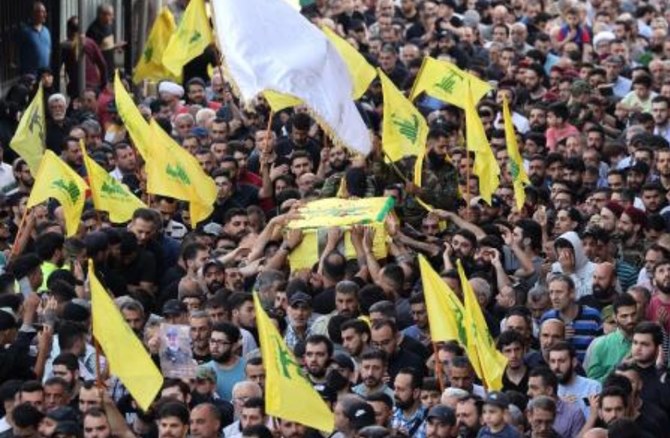
- Israeli hacks Lebanese phone network to book hotel in Beirut for 50,000 settlers ‘displaced by Hezbollah, Hamas and Iran’
- Israeli combat drones raided the towns of Mays Al-Jabal and an area between the towns of Alma Al-Shaab and Dhayra
BEIRUT: Hezbollah mourned two of its members on Wednesday, the 228th day of confrontations between the group and the Israeli army in southern Lebanon.
The total number of Hezbollah fatalities, along with its affiliated medics and members of its ally, the Amal Movement, has reached 330.
Confrontations continued between the two sides through airstrikes, with both sides employing combat drones in addition to conventional warfare methods.
Israeli combat drones raided the towns of Mays Al-Jabal and an area between the towns of Alma Al-Shaab and Dhayra. Two missiles fired by an Israeli combat drone targeted the town of Aita Al-Shaab.
Israeli artillery shelled the town of Markaba, causing a large fire that civil defense teams worked to extinguish.
The town of Hula was also subjected to Israeli artillery shelling, as were the outskirts of the towns of Tayr Harfa and Alma Al-Shaab.
The two Hezbollah members were killed on Tuesday night in an airstrike by an Israeli drone that targeted the town of Odaisseh; Mohammed Ali Bou Taam (born in 2000) from the town of Taybeh in southern Lebanon, and Ali Hassan Sultan (born in 1991) from the town of Souaneh in southern Lebanon.
Hezbollah targeted several Israeli military sites, including the Ramim barracks, with Burkan missiles, and the Al-Sadah site, and said in a statement that it “directly hit it with artillery shells.”
Brig. Gen. Mounir Shehadeh, the former Lebanese government coordinator to UNIFIL and former head of the military court, said that the escalation on the southern front carried two messages from Hezbollah. The first, he said, was “a response to the repeated threats from Israeli officials to launch a major military operation in southern Lebanon to push Hezbollah to withdraw to the north of the Litani Line. The second message is that the party is ready to escalate if Israel decides to enter Rafah and commit more massacres.”
Shehadeh said that Hezbollah was using new tactics and weapons. He said that targeting the newly established Israeli military sites was an indication of the capabilities it possessed, especially in intelligence and reconnaissance. He added that repeatedly targeting the Meron base and downing two balloons had caused Israel to lose control and air superiority over the northern front, especially as Hezbollah said that it has so far used only 20 percent of its qualitative capabilities.
The Israeli army has rigged combat drones; on Tuesday, a small drone launched by the Israeli army exploded in the direction of a house in the town of Naqoura.
Meanwhile, Israeli Channel 12 website noted “an increase in the use of drones by Hezbollah,” considering that “its lethal capability has increased.”
The website reported that a study conducted by the Alma Center, which specializes in researching the security challenges facing Israel in the north, stated that “24 incidents of drones entering Israeli airspace occurred in March, the number increased to 42 incidents in April, and 20 incidents were recorded in May.”
The website quoted officials at Alma Center as saying: “There is a difficulty related to the way drones fly toward the target.”
Tal Barry, director of research at Alma Center, told Channel 12 that “Hezbollah is using the current battle to evaluate the offensive and defensive capabilities of the Israeli army, and also to compare its capabilities with those of the Israeli army.”
Amid the tension on the southern front and increasing protests by Israeli settlers who were evacuated from settlements in the north, a video spread across Israeli websites, shared on social media, showing an Israeli man appearing on Israeli Channel 12. In the video, the man calls what he claimed to be Caesars Park Hotel (in Beirut), demanding evacuation for himself and thousands of Israelis.
The Israeli caller, speaking in Arabic, asked the person who answered from the hotel: “I am calling from Israel. There are 30, 40, 50 thousand people who need to come to Beirut because of Hezbollah, Hamas and Iran. Do you have any available space?”
The hotel employee responded with surprise, “Where are you from?” The Israeli caller answered in Arabic, “We are from Israel, we are 50, 60 thousand people, we want to come to Beirut to your hotel.” The employee angrily replied, “Go to hell,” and hung up.
The Lebanese hotel employee’s response angered the Israeli caller, who insulted the person on air.
Arab News contacted the hotel on Hamra Street in Beirut to confirm the Israeli call. A hotel source confirmed that the call was received by the employee “through the landline.”
The Israeli caller claimed on the Israeli TV channel that he had previously visited Beirut and stayed at the hotel, but the hotel source strongly denied this.
This Israeli infiltration via phone call was preceded by a similar infiltration at the start of the confrontations. Israelis used the Lebanese phone network to contact dozens of southerners who had evacuated their homes in border regions, inquiring whether they were in their residences or had abandoned them, pretending to be from financial institutions or relief associations. It was later revealed that based on people’s responses, the Israeli side was tracking the movement of Hezbollah members in order to demolish their homes.
The Secretary-General of Hezbollah Hassan Nasrallah revealed these communications and urged people to avoid using the Internet in the border region and to remove external surveillance cameras from homes because of Israeli infiltration. The Israeli army managed to kill a significant number of Hezbollah members by this method.
Joy in Palestinian refugee camp in Beirut as European trio advances cause
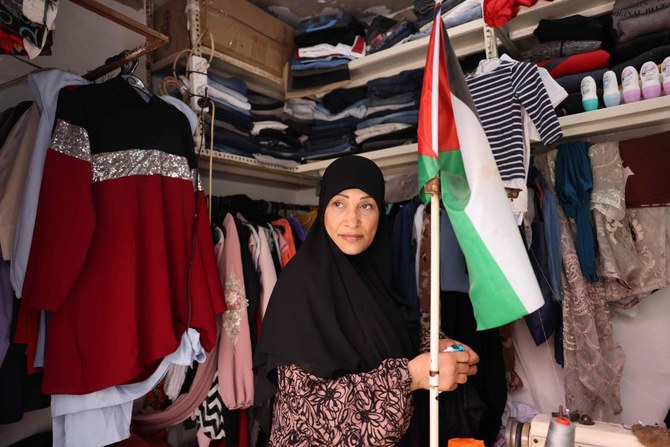
- “We hope that the whole world will recognize Palestine, and we are happy with this decision... It is a beautiful feeling,” said Alaa Ghozlan
- Israel was enraged by the move announced Wednesday by Ireland, Norway and Spain, arguing that it amounts to “rewarding terrorism”
SHATILA, Lebanon: In Beirut’s impoverished Palestinian refugee camp of Shatila — a maze of alleyways where posters honor fallen martyrs — residents expressed joy Wednesday after three European countries said they would recognize a Palestinian state.
“We hope that the whole world will recognize Palestine, and we are happy with this decision... It is a beautiful feeling,” said Alaa Ghozlan, 26, whose family is originally from Haifa, now in northern Israel.
“We now have hope to return to our country — a country I was not born in and was deprived of but which lives inside me despite everything,” he told AFP on a winding street in the camp.
Israel was enraged by the move announced Wednesday by Ireland, Norway and Spain, arguing that it amounts to “rewarding terrorism” after Palestinian militant group Hamas launched its unprecedented October 7 attack on Israel that sparked the bloodiest ever Gaza war.
Seven other European countries including Sweden have already recognized Palestinian statehood.
Lebanon hosts an estimated 250,000 Palestinian refugees, many living in poverty in the country’s 12 official camps, according to the United Nations agency for Palestinian refugees (UNRWA).
Most are descendants of survivors of what Palestinians call the Nakba — the “catastrophe” — when about 760,000 Palestinians fled or were forced from their homes by the 1948 war over Israel’s creation.
Shatila resident Samah Omari, 50, a housewife, said she was “very happy” with the decision, and expressed hope that it would eventually impact her and her family.
“People are dying in Palestine. We demand our rights and defend our land so that our state can be recognized by all countries,” she said.
“We hope to return to our country and not be refugees anymore,” she added.
The camp’s tumbledown walls are adorned with Palestinian flags and posters in support of militant groups including Hamas and their leaders.
Men on motorbikes and tuk-tuks squeeze past women shopping and schoolchildren making their way through the streets.
Above, matted electricity wires and plastic water tubes are bound precariously with rope or cables, some weighed down by clothes that have fallen from washing lines.
The United States and most Western European nations have said they are willing to one day recognize Palestinian statehood, but not before agreement is reached on thorny issues like final borders and the status of Jerusalem.
But Israel’s war against Hamas militants in Gaza, with its mounting death toll, has given the issue new impetus.
Suliman Abdel Hadi, 70, an official at the camp, said the timing of the decision was “important after October 7 because of the massacres carried out by the brutal Zionist enemy.”
“We see a bright future for the Palestinian cause,” said Abdel Hadi, whose family is from the Acre area, now in northern Israel.
“What happened today is the result of sacrifices made by the Palestinian people over 76 years of persecution, killing and destruction,” he added.
Hamas’s October 7 attack resulted in the deaths of more than 1,170 people, mostly civilians, according to an AFP tally of Israeli official figures.
Militants also took 252 hostages, 124 of whom remain in Gaza, including 37 the army says are dead.
Israel’s retaliatory offensive has killed at least 35,709 people in Gaza, most of them civilians, according to the Hamas-run territory’s health ministry.
On another street in Shatila, a man who gave his name as Abu Majdi, and whose father originally hailed from Haifa, called the decision “great” and said it was “baptised in the blood of martyrs.”
“This recognition will change the future of coming generations and the future of the Palestinian cause,” said the 63-year-old man, a Palestine pendant hanging from his neck.
Israel allows return to three evacuated West Bank settlements
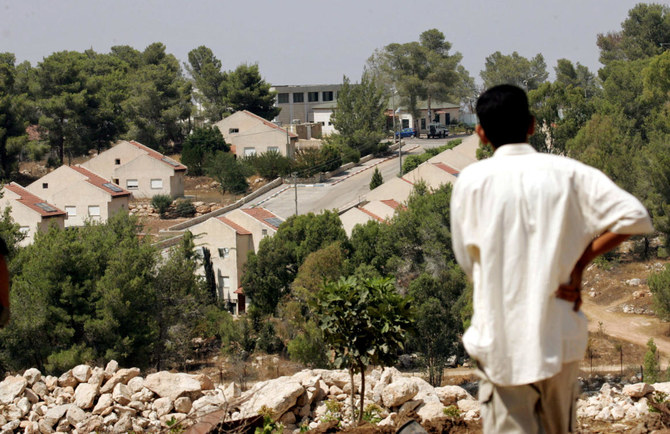
- The military announced the move on the day three European states said they would formally recognize the State of Palestine
- A fourth settlement, Homesh, was cleared for entry last year
JERUSALEM: The Israeli military has approved permission for Israelis to return to three former West Bank settlements they had been banned from entering since an evacuation ordered in 2005, the defense ministry said on Wednesday.
The three settlements, Sa-nur, Ganim and Kadim, are located near the Palestinian cities of Jenin and Nablus, both of which are strongholds of armed militant groups in the northern West Bank.
A fourth settlement, Homesh, was cleared for entry last year after parliament passed an amendment to the so-called “disengagement law” of 2005. Permission from the military, which has overall control of the West Bank, was required for any return to the other three former settlements.
The military announced the move on the day three European states said they would formally recognize the State of Palestine, and as Israel’s military offensive against the Palestinian militant group Hamas continued in the Gaza Strip.
It took the decision despite international pressure on Israel to curb settlement expansion in the West Bank, which Palestinians want as the core of a future independent state alongside Gaza.
“The Jewish hold on Judea and Samaria guarantees security, the application of the law to cancel disengagement will lead to the development of settlement and provide security to residents of the area,” Defense Minister Yoav Gallant said in a statement, using the Biblical names for the West Bank that are often used in Israel.
There was no immediate comment from the Palestinian Authority.
Last year’s amendment to the disengagement law was seen as opening the way to re-establishing former West Bank settlements evacuated in 2005 under a plan overseen by former Prime Minister Ariel Sharon.
Under the plan, which was opposed by the settler movement at the time, all 21 Israeli settlements in Gaza were ordered to be evacuated. Most settlements in the West Bank were unaffected apart from the four that will now be accessible again.
More than 500,000 Jewish settlers are now estimated to be living in the West Bank, part of territory captured by Israel in the 1967 Middle East war, with a further 200,000 living in East Jerusalem.
For Palestinians and most of the international community, the settlements are considered illegal. Israel disputes this, citing the Jewish people’s historical, biblical and political links to the area as well as security considerations.
Despite international opposition, settlements have continued to expand strongly under successive Israeli governments.





